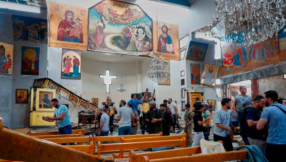Christianity Spreading in Iran via Multimedia
Iranian Muslims in growing numbers are coming to know and accept Jesus Christ through satellite TV, internet and other media outlets, reported Open Doors Middle East field worker Stefan De Groot.
"New media is becoming increasingly important in the future to strengthen the church," De Groot said.
Formerly, Muslims in restricted countries such as Iran usually only come to Christianity through miraculous experiences such as visions or dreams, noted the group; Christians are prohibited from evangelizing under Iranian laws.
While the Iranian Government tolerates ethnic Christians, allowing them to hold services, guards regularly stand in front of church doors to decide if a person entering the sanctuary is an ethnic Christian. New converts to Christianity put their lives at risk and face persecution from family, friends, employers and authorities when they denounce Islam. Both lifelong believers and new converts have reportedly been imprisoned, beaten and even murdered.
"In spite of this pressure, the house church movement has seen spectacular growth," De Groot said. "This is not happening just because of dreams and miracles...The majority of people now come to faith through the multimedia, and especially satellite TV. Nobody can control which programmes Iranians watch."
De Groot noted that Christian satellite programme producers are receiving stories of people who have converted to Christianity after watching their station.
SAT-7, the first Arabic language Christian satellite channel to broadcast into the Middle East, also noted exceptional growth in Iranian house churches during an interview with US Christian newspaper, The Christian Post, in April. SAT-7 has a viewer reach of eight to 10 million in the Middle East and north Africa.
In addition to producing television programmes, Open Doors said it continues to use traditional evangelism techniques.
"Open Doors continues to proceed with the 'old fashion work'," De Groot said. "I expect that our literature distribution in Iran will increase by 10 to 15 percent in the coming years. Much of the literature which we distribute complements, directly or indirectly, the programmes from the satellite channels."
The international ministry Open Doors began in 1955 and seeks to support and strengthen persecuted believers in the world's most difficult areas through Bible and Christian literature distribution, leadership training and assistance, Christian community.













